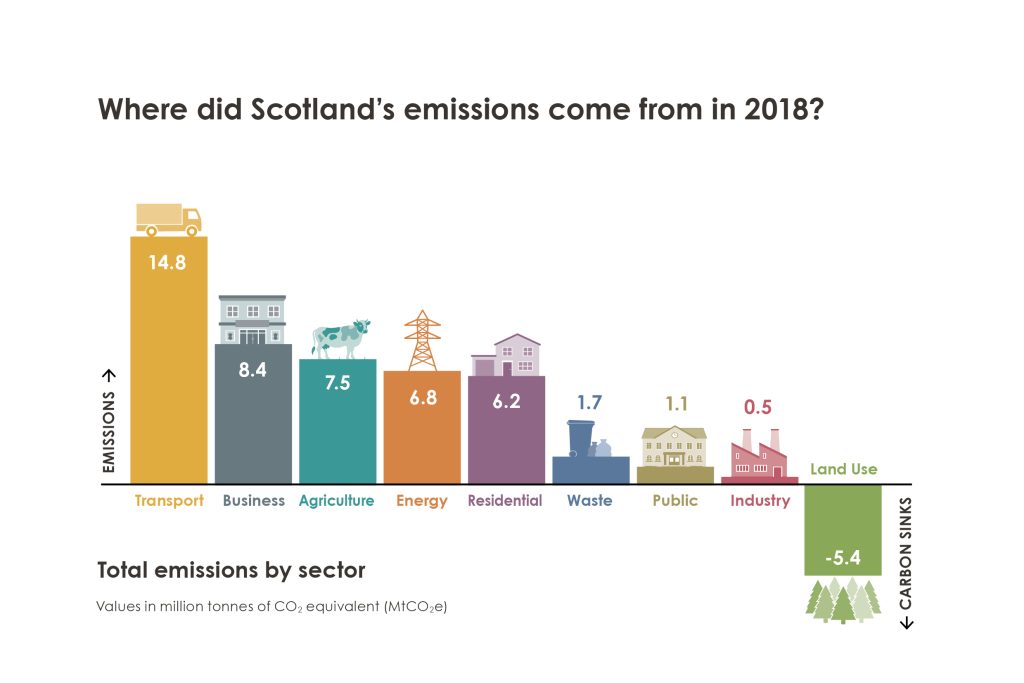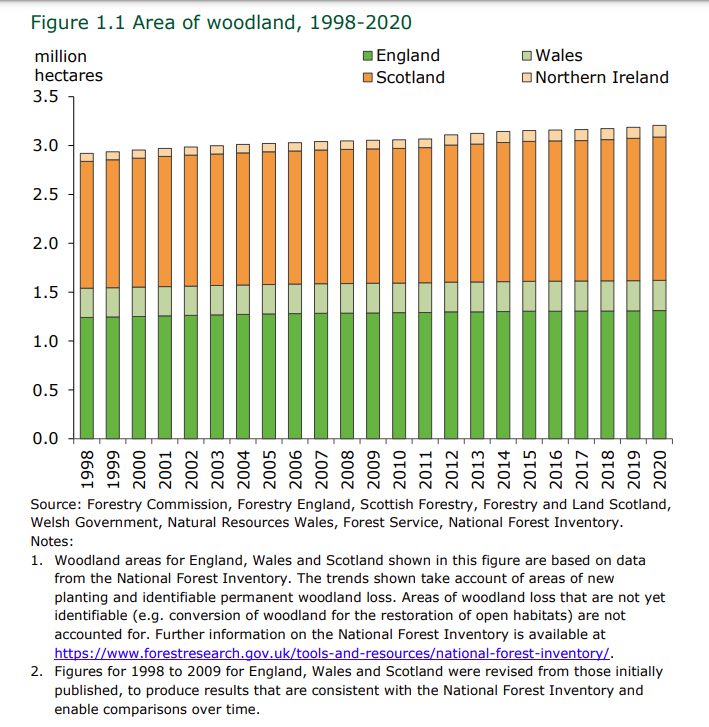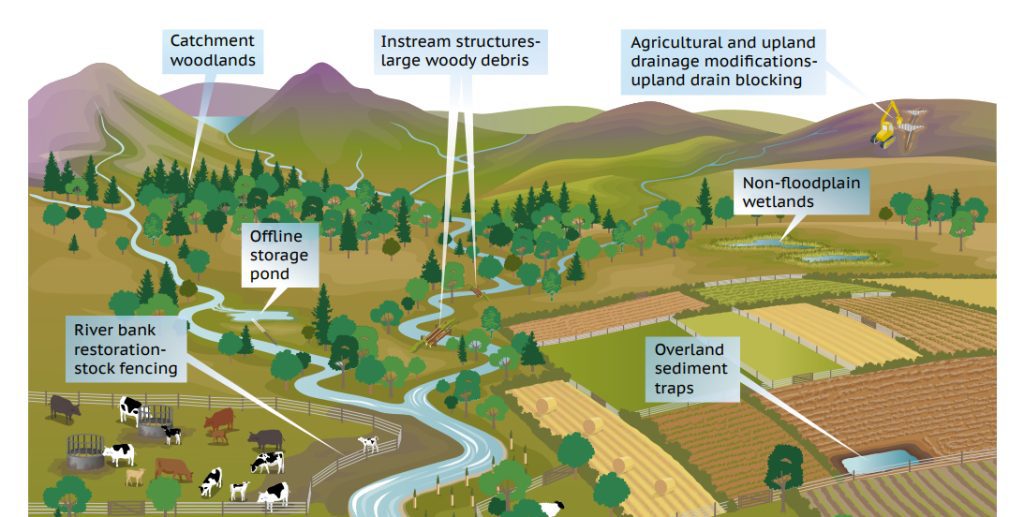Land Use
How can land use help reduce carbon emissions and lessen the impacts of climate change, whilst delivering food, biodiversity, social amenity and economic benefits?
How can the decisions taken across agriculture, forestry, water management, biodiversity and planning support each other to benefit the natural environment, support sustainable local businesses and create healthy rural and urban communities?
The Land Use Strategy for Scotland was the first of its kind in the world, taking a holistic approach to land use management, and recognising that different sectors are inextricably linked. It places climate change at the centre of the principles to guide actions.
The third land use strategy, covering 2021-2026, was published in March 2021.
Read the Land Use Strategy for Scotland
Agriculture
Agriculture is the third largest source of greenhouse gas emissions in Scotland, behind the transport and business sectors. (Source: Scottish Greenhouse Gas Emissions 2018 )
Emissions are largely from livestock and soils. Although the Climate Change Committee recognises that it is not possible to decarbonise the sector completely, there are options that can significantly reduce emissions, such as low-carbon farming practices and productivity improvements.

Read more about where Scotland’s emissions come from in our blog
Read about Farming for a Better Climate – an initiative to move towards more low carbon farming
Forestry
Forests are important carbon sinks, and the amount of carbon absorbed by Scotland’s land and forests is increasing. This is crucial on the road to net zero.
The Scottish Government is committed to increasing forest cover. This has significant benefits for biodiversity and resilient silvi-culture. A warmer wetter climate can also pose significant risks to tree health through extreme weather events or increased spread of pest and diseases.
This graph from The Forestry Commission Forestry Statistics 2020 shows total area of woodland increasing in the UK since 1998.

Peatland management
A quarter of Scotland is covered by peat – an important carbon sink which also prevents flooding, filters water and provides important habitats.
The condition of peatlands is important for how well it captures and stores carbon. Peatlands that dry out will release carbon and contribute to climate change. Some peatland management practices have contributed to this through drainage, heavy grazing or inappropriate burning. The Scottish Government has targets for on-going restoration of degraded peatlands.

Source Peatland ACTION Restoring Scotland’s peatlands, Scottish Natural Heritage
The Climate Change Plan update notes that, to reach Scotland’s 2032 emissions targets, annual peatland restoration needs to be ‘far higher’ than the current 20,000 hectare annual target.
Sustainable soils
Soils are a critical resource not only for food production and biodiversity but also for managing water and storing carbon.
Climate change will impact soil wetness, soil temperature and soil degradation, including loss of organic matter, erosion and compaction as a potential result of changing rainfall patterns. This all impacts on how well the soil performs.
Natural flood management
All land use decisions play a role in how well we can manage increased rainfall and changes in rainfall patterns and extreme weather events. Hard flood defences can disrupt natural processes and increase flooding in other parts of a catchment.
Scottish Government policy favours Natural Flood Management, which includes restoring and enhancing natural features and characteristics to slow and contain flood water.

Source SEPA Natural Flood Management Handbook
Our Response
A key research need across land use is to analyse the early impacts of climate change and assess how different measures can help reduce emissions and manage impacts.
To achieve this we promote cross-sectoral dialogue and research that can directly inform land use policy options. We also provide systematic evidence reviews to understand the state of confident knowledge across traditional disciplinary boundaries.
Agriculture
Our work is helping to identify where tangible change might be achieved in modern farm business practice. Our projects explore new farming techniques, models to track emissions intensity and life cycle analysis. There is a particular interest in the potential for improvements in the livestock production sector.
Forestry
We provide applied research on how forest expansion and restocking can support outcomes including carbon sequestration potential, biodiversity, shelter for animals, timber production and increased resilience to extreme weather events. We are also involved in testing and demonstrating sustainable forestry practises.
Featured projects
Sustainable soils
Soil is a fundamental resource for Scotland, underpinning our society, economy and environment. It is important to understand the factors essential to its sustainable management.
Research in this area looks at how soil protection and management is a feature of a range of policy areas and how they can work together.
Featured Projects
Carbon benefits from peatlands
Peatlands play an important role in the carbon cycle and are increasingly becoming a focus point for policymakers and researchers. They also deliver a wide range of other benefits including to water, agriculture and biodiversity, which impact on both public and private interests. If damaged they become a source of greenhouse gas emissions, but when restored they have potential to store significant amounts of carbon.
Our projects examine potential carbon abatement from peatland restoration, issues with restoration methods, the extent of peatland that has been drained in Scotland and the practical implications of a revision to the International Inventory for Wetlands under the Intergovernmental Panel on Climate Change (IPCC).
Featured projects
Land use
We derive a wide range of benefits from how we use the land. It underpins our economic prosperity, and supports essential supplies of food and clean water. Sustainable land use management is essential to how we reduce our greenhouse gas emissions and adapt to a changing climate.
Our projects explore the way land is managed and the options that might support more integrated approaches in the longer term.
Featured Projects